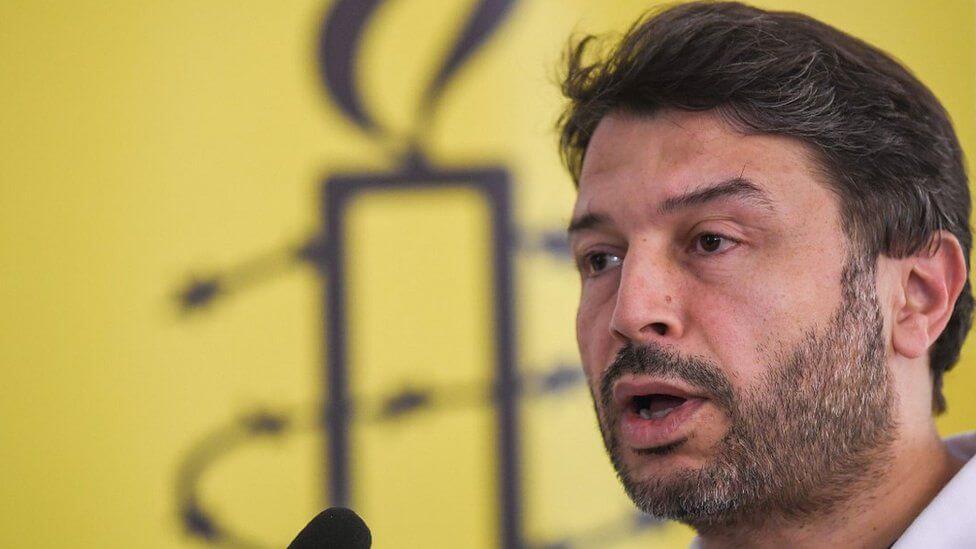On Tuesday, Turkey’s highest court of appeals overturned terrorism-related charges against Amnesty International’s former chief in the country, Taner Kılıç, and three activists.
The Court of Cassation’s decision to overturn the “baseless convictions” is a “huge relief,” Amnesty International said. “Kılıç’s case was quashed on the grounds of ‘incomplete investigation’ and referred back to the first instance court,” it noted.
Kılıç, along with nine activists, was arrested in July 2017 for participating in a conference in the Büyükada island about promoting human rights in Turkey. He was convicted for being a member of a terrorist organisation and committing crimes on behalf of such a group. The court said Kılıç planned to oust the government by plotting an uprising.
In 2020, a Turkish court sentenced Kılıç to six years and three months in prison on the charges of supporting Fethullah Gülen, a United States-based Turkish cleric who Ankara blames for orchestrating the failed military coup in 2016. Turkey has also labelled his organisation, FETÖ, a terrorist group and has repeatedly asked the US to extradite Gülen.
Such a relief that the unfair convictions against İdil Eser, Özlem Dalkıran and Günal Kurşun have been overturned. But a relief mixed with disappointment that for our colleague Taner Kılıç, there are still challenges ahead. We will be by his side, at every step. https://t.co/nSXoPUtElN
— Agnes Callamard (@AgnesCallamard) November 22, 2022
Turkish authorities insist that Kılıç has close ties with the Gülenist movement, citing his several bank accounts at Bank Asya, which has been linked to Gülen. They also claim that his children have been educated in schools affiliated with the Gülenist movement.
In May, the European Court of Human Rights (ECHR) demanded that Turkey release Kılıç, calling his arrest “unlawful and arbitrary.” The ECHR said the court relied on the “unreasonable” interpretation of legislative provisions to sentence Kılıç and said his arrest violated his right to free expression.
In this regard, Amnesty International chief Agnès Callamard said Tuesday’s ruling “brings to an end a travesty of justice of spectacular proportions.”
“While we are hugely relieved that the convictions have finally been quashed, the fact that the court has ruled that Taner’s case requires further investigation is disappointing,” she noted, referring to the case being transferred back to a lower court.
“Today’s ruling reveals the true purpose of such politically motivated prosecutions: using the courts as a weapon to silence critical voices,” Callamard remarked, adding, “Whilst we celebrate this decision today, we do not forget that across Turkey many human rights defenders are languishing in jail, living in fear of arrest or facing similar unfounded prosecutions.”
While we are hugely relieved that the convictions have finally been quashed, the fact that the court has ruled that Taner’s case requires further investigation is disappointing.
— Amnesty International (@amnesty) November 22, 2022
According to the ‘Freedom in the World 2022’ report, Turkish President Recep Tayyip Erdoğan has led a “wide-ranging” crackdown on critics and opponents since 2016. Accordingly, the report labels Turkey as “not free.”
The report cites the arrest and sentencing of Osman Kavala as an example of how Turkey continues to “suppress dissent and limit public discourse.” In April, a Turkish court ordered that Kavala be jailed for life without parole after finding him guilty of financing the 2013 Gezi Park protests that eventually led to nationwide protests against Tayyip Erdoğan.
Kavala was arrested in 2017 over his alleged involvement in the protests against Erdoğan’s government and has been in jail since. Erdoğan has also accused Kavala of financing the 2016 military coup attempt and funding anti-government organisations. Although he was acquitted of all charges in February 2020, an appeals court overturned the verdict the following month.

